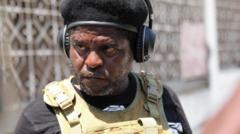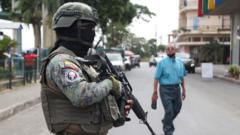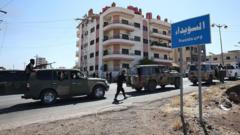The US has indicted Jimmy Cherizier, aka "Barbecue," for soliciting funds to sustain his gang's violent operations in Haiti, while offering a $5m reward for information leading to his capture as gun violence and humanitarian crises escalate.
US Charges Haitian Gang Leader with Funding Criminal Activity

US Charges Haitian Gang Leader with Funding Criminal Activity
Jimmy Cherizier, notorious for leading gang violence in Haiti, faces US federal charges for allegedly soliciting funds to support his operations.
US federal prosecutors have officially charged Jimmy Cherizier, the infamous Haitian gang leader known as "Barbecue." Cherizier heads an alliance of gangs that dominate Port-au-Prince, the Haitian capital. The indictment states that he, alongside US national Bazile Richardson, 48, solicited funds from the Haitian diaspora in America to pay gang members and acquire firearms, violating US sanctions. Cherizier, once a police officer, remains at large in Haiti while leading the group Viv Ansanm (Live Together). The US is offering a reward of $5 million for information that could lead to his apprehension.
"There's a good reason for the $5 million reward for Cherizier's capture," said US Attorney Jeanine Pirro during a press briefing on Tuesday. She emphasized that he is a gang leader implicated in grievous human rights violations, including assaults on American citizens within Haiti. Prosecutors contend that he was instrumental in the 2018 La Saline massacre that resulted in 71 fatalities, destroyed over 400 homes, and involved multiple acts of sexual violence.
Richardson, who was arrested in Texas last month, is a naturalized US citizen who spent his early years in Haiti before residing in North Carolina. He is charged with raising funds that were allocated to pay gang leaders and secure weapons, with officials stating that both men effectively financed Cherizier's criminal operations, exacerbating the security crisis in Haiti. Assistant US Attorney General John Eisenberg affirmed that the US will actively pursue individuals who contribute to Haiti's violence and instability.
In May, US authorities classified Viv Ansanm as a foreign terrorist organization, asserting control over Port-au-Prince since approximately 2020. Earlier this year, the gang even attempted to position itself as a political entity. In addition to US sanctions, Cherizier faces restrictions imposed by the United Nations, Canada, and the UK, all of which accuse him of escalating violence in Haiti. If captured, extradition to the US is a possibility; nevertheless, Cherizier continues to wield considerable influence on the streets, with protection from his gang members.
Since the assassination of President Jovenel Moïse by unidentified assailants in 2021, Haiti, the poorest country in the Americas, has been engulfed in economic turmoil, diminished political order, and intensifying gang-related violence. The pervasive gang control in Port-au-Prince has led to a near-total breakdown of law and order, significantly hampering health services and leading to a burgeoning food security crisis.
Recent efforts by a UN-backed Kenyan security force have struggled to restore order in the Haitian capital, and the humanitarian situation has deteriorated severely. Current UN estimates indicate that over 5.7 million people—more than half of Haiti's population—are experiencing acute food insecurity, while more than one million individuals are internally displaced within the country.
















